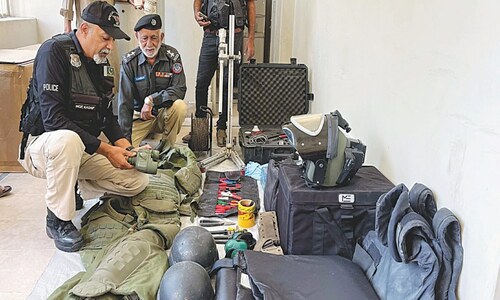KARACHI: It was the year 1981, when in the attic of a small farm in Ficquelmont, a note was found in a bottle, which turned out to be written by six German soldiers belonging to the second regiment, stationed there during the WW1. The farmhouse where it was retrieved was located in the Eastern France region of Lorraine, only 30km away from Verdun, which was the bloody battleground between France and Germany in 1916, where millions of young soldiers from both sides lost their lives.
The message was finally translated and to date is considered to be one of the most eloquent and beautiful messages of peace originating from World War I: “Utopia and possible garden of Eden is a united Europe.”
And that is from where Ingo Espenschied began to narrate the bloody tale of Franco-German relations which over a century transformed into one of peace and prosperity. Espenschied’s lecture charted the adversarial relationship for much of the second millennium between the two states. According to him, Pakistan and India too share a complicated relationship and could learn much from the evolution of Franco-German cooperation since the Élysée Treaty was signed in 1963.
Organised by the German Consulate to mark the end of 100 years since World War I, Ingo Espenschied’s history lesson on Friday kept the audience enraptured, where he showcased his extensive experience of researching the relationship between France and Germany.
Espenschied studied international politics in Mainz; he then went to France where he studied at the Sorbonne University, Paris, and then went to the London School of Economics. He is thus considered an expert on Franco-German as well as European relations. Espenschied has even been approached by the former president of France, François Hollande’s team to provide an overview of the history between the two states, which the president then included in one of his speeches.
“There is no real recipe to improve the relationship between India and Pakistan. However, the success story between France and Germany can give many examples on how to overcome hostilities between the two states,” Espenschied said.
“The French were considered to be a traditional enemy by the Germans but today the two states represent a unification that resulted in bringing together 28 countries to form a united Europe,” he added. Relations between the two countries have evolved considerably that today both are considered to be the main force behind the increasing cooperation within the framework of the European Union.
The EU, he said, represents a project of cooperation and peace. “However, that was not always the case as Europe has always been the country of war. Today it has become a continent of peace, open borders and cooperation and Pakistan and India too can learn much from this example. However, firstly both countries must realise that nationalism and imperialism are not conducive for peace in any region,” he explained.
In Europe too, in the name of nationalism, millions of young lives were lost, countries and cities destroyed, as was shown in Espenschied’s lecture. He reiterated that this must be avoided at all cost by Pakistan and India.
“Important personalities also play an important role in galvanising the peace talks. In the context of France and Germany, men such as Charles de Gaulle and chancellor Konrad Adenauer connected with the will of the people for peace and made it possible. The signing of the Élysée Treaty allowed both states to let go of their rivalry and hostilities and press the reset button to embark on a new relationship of peace.”
However, personalities or politicians in isolation can never be successful, said Espenschied. “It is the job of institutions to work together to make the relationship durable. This is possible through exchanges between governments. Cooperation between states is very necessary and exchanges between the people of Pakistan and India is also a necessary step,” he said.
Published in Dawn, November 17th, 2018












































